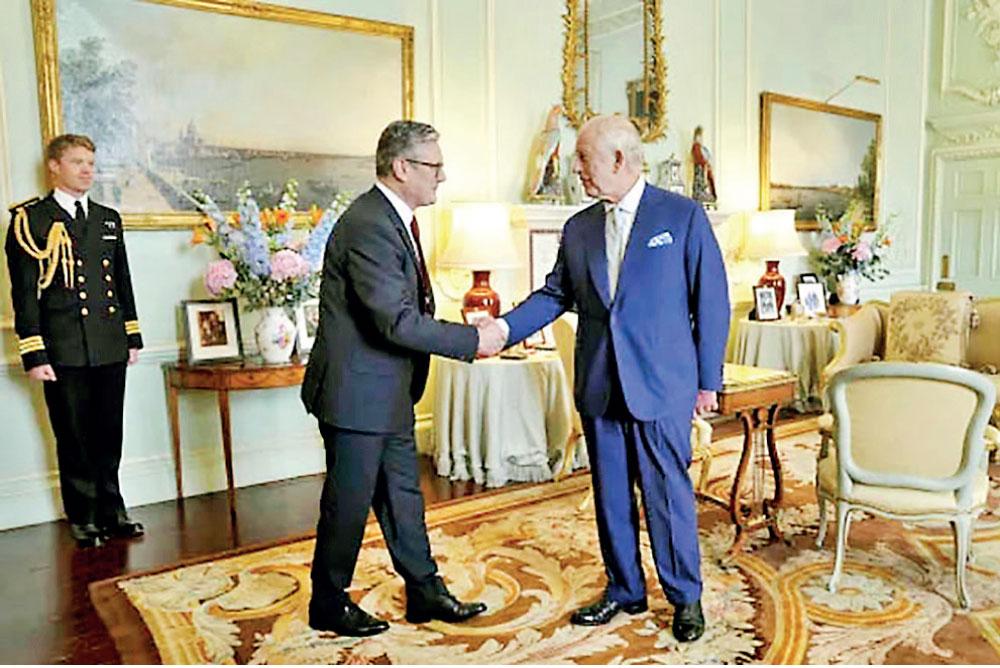Reply To:
Name - Reply Comment

King Charles holds his first audience with new British PM Sir Keir Starmer
 As a corrective measure, the incoming Labour government plans to have closer ties with the EU while ruling out re-entry into the EU
As a corrective measure, the incoming Labour government plans to have closer ties with the EU while ruling out re-entry into the EU
 Many reasons are given for the crushing defeat of the Rishi Sunak-led Conservative Party in the recent British general election. But its abysmal performance could be broadly attributed to the problems it created for itself by walking out of the European Union (EU) in a move called Brexit in 2020 without a plan to tackle the situation after the exit.
Many reasons are given for the crushing defeat of the Rishi Sunak-led Conservative Party in the recent British general election. But its abysmal performance could be broadly attributed to the problems it created for itself by walking out of the European Union (EU) in a move called Brexit in 2020 without a plan to tackle the situation after the exit.
Brexit created instability in the Conservative government. Prime Minister Theresa May gave way to Boris Johnson, who in turn gave way to Liz Truss. And after only 49 days in office, Truss gave way to Rishi Sunak. All three struggled to stem an economic decline which could be attributed to Brexit.
Quagmire of Misery
Liz Cookman, writing in Foreign Policyabout life in England in 2023, said that families stockpiled blankets to ward off the cold as they sat shivering in their homes with no heating. Long lines of people, who could not afford to feed their children, formed at the local food bank. Britain, she said, was a “quagmire of misery.”
Most shops closed at 4 p.m. and didn’t bother opening three or four days a week. There was an egg and potato shortage. Poverty and inequality were rising.
“Chief among all the culprits is the destructive effect of Brexit and bad governance,” Cookman said. Britain became the world’s worst-performing big economy in 2023 according to the IMF. Brexit stifled imports and exports. It contributed to a labour shortage of about 330,000 workers.
Because of Brexit, Britain’s economy lost British Pounds (BP) 140 billion and London itself lost BP 30 billion, said the city’s Mayor Sadiq Khan in January 2024 quoting a report by Cambridge Econometrics. London itself had 290,000 fewer jobs because of Brexit.
Scotland, which has been in a union with England since 1707, began to pursue a second independence referendum. Around 62% of Scottish voters wanted to remain in the European Union.
The COVID-19 pandemic was mismanaged and casualties soared. UK’s National Health Service (NHS) deteriorated significantly, showing a significant backlog of patients needing treatment for serious diseases. Many were forced to go abroad for treatment. Critics argued that the government’s policies disproportionately favoured the wealthy.
In the 2016 referendum on Brexit, 52% had voted for exiting the EU. But in May 2024, 55% thought that it was wrong to have left the EU.
What would Labour’s policies be?
As to what Labour’s domestic and foreign policies will be can be gleaned from the statements of its leader Keir Starmer and the new Foreign Secretary David Lammy. Labour is traditionally seen as being Left-of-Centre, but like former Labour Prime Minister Tony Blair, the new Prime Minister Keir Starmer is more Centre than Left.
Starmer has promised to control spending and talked tough on immigration and social security. He is a flag-waving nationalist. He has said that he will work with whoever wins the Presidency in November. On defence, Starmer has mirrored the Conservative promise to raise military spending to 2.5% of the GDP, a bit above NATO’s recommendation of 2%.
On China, Starmer is likely to continue the policy of criticizing Beijing’s human rights record while recognising that UK’s economy will collapse without trade with China.
On Israel and Gaza
But Labour is likely to be more radical and pro-Palestine on the goings on in Gaza. This is because Labour lost in constituencies with a substantial population of Muslims and liberals due to its pro-Israel and anti-Palestinian stance regarding the genocide in Gaza in the run-up to the elections.
Speaking to UK radio station LBC in October 2023, Starmer said that Israel “has the right” to withhold power and water from Palestinian civilians in Gaza. This caused outrage among many left-wing and Muslim voters. The anger was compounded after the party refused to back a Scottish National Party (SNP) motion calling for an immediate ceasefire in Gaza, though Labour did pass its own similar motion shortly afterward.
The party lost several seats because of its stand on Gaza. Five independent candidates who had been vocal in their support for Gaza won, while a surge in votes for independents elsewhere denied Labour a victory in areas they were expected to win, CNN reported.
In Leicester South, Labour’s shadow Cabinet member Jonathan Ashworth lost his seat by 979 votes to Shockat Adam, an independent candidate who made his support for Gaza a key part of his electoral pledge to voters. “This is for Gaza,” Adam declared in his victory speech.
Many of the seats where Labour lost votes over its position on Gaza had sizable Muslim populations. In Islington North, liberal pro-peace politician Jeremy Corbyn was re-elected to the seat he has held since 1983 – but this time as an independent, rather than as Labour. Corbyn won 49.2% of the vote, while the Labour candidate came in second with 34.4%.
Corbyn said the voters of Islington North were “looking for a government that on the world stage will search for peace, not war, and not allow the terrible conditions to go on that are happening in Gaza at the present time.”
In Blackburn, Labour incumbent Kate Hollern – who won a majority of 18,304 at the 2019 general election – lost by 132 votes to independent candidate Adnan Hussain. In Dewsbury and Batley, the independent Iqbal Mohamed defeated Labour incumbent Heather Iqbal. And in Birmingham Perry Barr, independent Ayoub Khan defeated Labour incumbent Khalid Mahmood by 507 votes.
Progressive realism
Britain’s new Foreign Secretary, David Lammy, has indicated that the new Labour government’s overall foreign policy will be based on the concept of “progressive realism” which is “using realistic means to pursue progressive ends.” The concept envisages the use of power in the service of just goals such as countering climate change, defending democracy, and advancing the world’s economic development.
In an article Lammy wrote in the American magazine Foreign Affairs dated April 17, 2024, he says that the basic ingredients of “progressive realism” are: an implacable hostility to Putin’s Russia; a mix of firmness and accommodation vis-à-vis China; and closer relations with the countries of the Global South, including India.
Lammy appear committed to calling for a ceasefire in Gaza and also to working out a “Two State” solution to the Palestinian question. “The United Kingdom cannot end this terrible conflict (over Gaza). But it does have the capacity to surge aid to support rebuilding, and a key goal for the Labour Party is to work with international partners to recognize Palestine as a state, as a contribution to securing a negotiated two-state solution,” Lammy says in the article.
He wants to develop closer ties with Europe also, though he feels that the UK cannot now re-join the European Union (EU).
Global situation
Lammy charged that the Conservatives treated with contempt UK’s global reputation for upholding the rule of law. The UK left the European Convention on Human Rights, he pointed out. He described the Conservatives’ approach to the Global South as “callous” as it undermined the UK’s standing as a “development superpower.”
Instead of fighting for the hearts and minds of the new global middle class, the then Foreign Secretary Boris Johnson publicly recited a colonialist poem by Rudyard Kipling during a 2017 visit to Myanmar, Lammy recalled.
The UK should champion multilateral causes, build institutions, defend democracy, stand up for the rule of law and combat poverty, Lammy said.
He lamented that democracies have become more economically dependent on authoritarian states, with the share of world trade between democracies declining from 74% in 1998 to 47% in 2022. He pointed out that the newly emerging powers like Brazil, India, Saudi Arabia, and the UAE are ignoring the EU, UK and the US. But Russia, is getting their support.
Lammy described Russia as a “long-term, generational threat that requires a long-term, generational response.”
To handle these changes, it is ever more important that UK develops closer cooperation with the EU,” Lammy said. And the centre piece of UK-EU relationship should be a security pact, he added.